Achievements and Announcements
ACHIEVEMENTS
- Grants support child development and wound-healing
- UniSA climbs nine spots in Times Higher Education Young University Rankings
- Hall of Fame honour for UniSA augmented reality researchers
- UniSA students awarded scholarships for outstanding STEM research
- International recognition for UniSA’s Enterprise Hub
- UniSA’s Dr Evangeline Mantzioris features in Webby Award-winning podcast
- Dr Julie Collins named SA’s Historian of the Year
- Zurich honours for UniSA postdoc investigating how buildings affect our brains
- Sir Eric Neal celebrates his 100th birthday
- Contemporary arts star receives Helpmann Academy InReview Mentorship
- King’s Birthday Honours for UniSA community
- Other recent award winners
ANNOUNCEMENTS
APPOINTMENTS
- UniSA welcomes new Chancellor and Council members
- UniSA VC joins committee to drive Universities Accord reforms
ACHIEVEMENTS
Grants support child development and wound-healing
Two UniSA wins in the latest National Health and Medical Research Council grants are launching valuable projects that aim to teach children to be better learners, and deliver a more effective solution for treating chronic wounds.
Teaching children to be better learners
World-leading research to determine the benefits of teaching children how to learn, and manage their own learning, is being undertaken with 4000 students at 57 primary schools across South Australia.
Co-funded by the Department for Education and a $921,000 NHMRC Partnerships Project grant, the project is being led by UniSA in partnership with the department, and builds on an initial project undertaken in Europe.
Project lead Professor Sally Brinkman says: “This is an opportunity for the highest quality science to inform teachers, schools and education systems in South Australia and beyond.
“We have high hopes that this self-regulated learning approach will have a positive impact for all students, supporting them in their learning journey throughout life.”
The randomised control trial will teach self-regulated learning techniques to children in years 2,4 and 6, providing them with specific skills to manage their own learning in a way that is expected to have a positive long-term impact over their educational journey.
The practices teach children how to modify and manage goal setting and equip students with the ability to strategically adapt their learning strategies in response to challenges or setbacks.
Teachers received training in Term 1 2024, and the students are receiving specific lessons over seven weeks in Term 2. Researchers will measure the outcomes of the group against those in the control group not receiving the specific lessons.
Alongside the main trial of 57 metropolitan and country schools, a smaller study will take place on the Eyre Peninsula to highlight any adaptations needed for small schools and cultural relevance.
Dissolvable patches a promising treatment for chronic wounds
Dissolvable microneedle patches loaded with novel silver nanoclusters that destroy deep bacterial infections could be a breakthrough treatment for chronic wounds, which affect 450,000 Australians and cost the country $3.5 billion a year.
The patches, applied to chronic wounds, will penetrate wound barriers to deliver antimicrobials at the localised deep infection site without affecting nerves or blood vessels, reducing potential side effects, according to UniSA researcher Dr Hanif Haidari.
The Future Industries Institute-based scientist has been awarded a $674,400 Investigator Grant from the NHMRC to further his research.
Dr Haidari says the microneedle patches offer a promising and safe alternative to current antibiotics and other conventional antimicrobial dressings, which are administered at frequent and high doses in a bid to reach the bacterial biofilms located deep below the skin surface. This leads to antimicrobial resistance and toxicity, delaying wound healing.
The patches are designed to gradually dissolve over 24 hours, leaving no waste or need for removal and can be self-administered at home. Because they are also sensitive to changes in wound pH, indicating the level of infection, they release silver at appropriate, slow, and sustained doses ensuring targeted delivery with maximum therapeutic efficacy.
“Not only do the microneedles kill the bacteria, but they also create optimal conditions for healing,” Dr Haidari says.
Clinical trials are a possibility within the next five years, depending on resources and funding.
UniSA climbs nine spots in Times Higher Education Young University Rankings
UniSA has climbed to 43 in the Times Higher Education (THE) Young University Rankings 2024, ranking as one of the world’s top 50 and Australia’s top 10 (ranked 9) young universities.
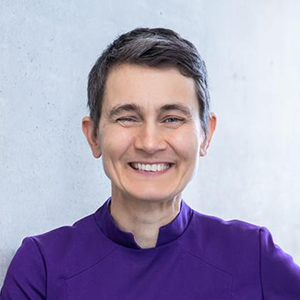
UniSA Deputy Vice Chancellor for Research and Enterprise, Distinguished Professor Marnie Hughes-Warrington AO, says UniSA ranked first in Australia and 11th in the world in THE’s industry performance indicator, which measures how much research income an institution earns from industry and the number of patents that cite UniSA research.
“This success reflects UniSA’s focus on industry engagement and our ability to collaborate with and support industry,” Prof Hughes-Warrington says.
“We also ranked 40th in the world for research quality, which is another incredible achievement.”
The research quality indicator measures citation impact, research strength, research excellence and research influence. You can find out more about the methodology by visiting the THE website.
“It is our ambition to rank among the very best in Australia, and the world,” Prof Hughes-Warrington says.
Meanwhile, in the recently published QS University Rankings, UniSA ranked in the top 350 universities in the world (#340).
Hall of Fame honour for UniSA augmented reality researchers
Two UniSA researchers have made history by being inducted into the Augmented World Expo (AWE) XR Hall of Fame for their groundbreaking work in augmented reality (AR) and virtual reality (VR) over the course of their careers.
Professor Mark Billinghurst and Emeritus Professor Bruce Thomas, who are based at UniSA’s Australian Research Centre for Interactive and Virtual Environments (IVE), are among 101 pioneers honoured worldwide for their roles in building the AR and VR industry.
They join such world-famous people as Ivan Sutherland, who developed the first AR head-mounted display, science fiction writer Neal Stephenson, who coined the term Metaverse, and Palmer Luckey, who founded Oculus and created the forerunner of the Oculus Quest VR display.
The researchers are the only AWE XR Hall of Fame recipients based in Australia, and the University of South Australia is the only university in the world with more than one academic included in the list, reflecting its status as a leading institute for AR/VR research.
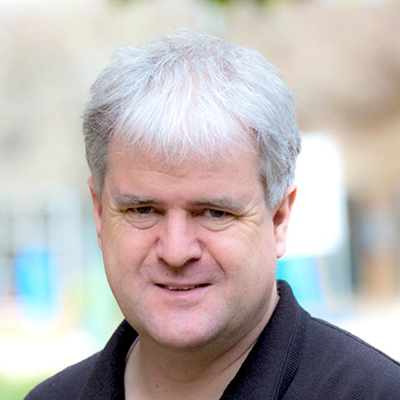
Prof Billinghurst is renowned for his innovative approach to using AR and VR for enhancing face to face and remote collaboration, and making AR technologies more accessible and practical for use across various domains.
He is well known for co-developing the open-source computer tracking library, ARToolKit, with Professor Hirokazu Kato, and for his work in empathic computing, shared spaces and collaborative augmented reality systems.
His contributions include the invention of the award-winning AR MagicBook, a mixed reality interface that uses a real book to seamlessly transport users between reality and virtuality.
Prof Billinghurst also pioneered multimodal input methods for AR/VR interaction, combining natural language and AI techniques to allow interaction with an intuitive mix of voice, gesture, speech, gaze and body motion.
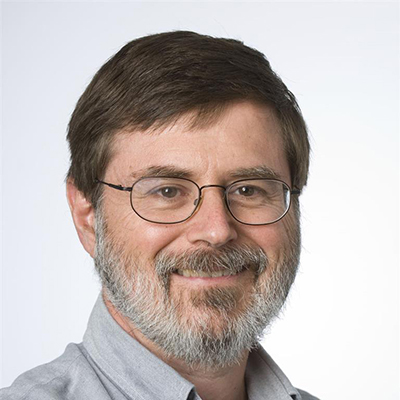
Professor Bruce Thomas co-developed the first outdoor AR game, ARQuake, in the late 1990s with Dr Wayne Piekarski, former co-director of UniSA’s Wearable Computer Lab. The pair also attempted to commercialise Tinmith, an AR headset and backpack developed in the early 2000s. This pioneering work set new benchmarks for interactive AR experiences.
AWE XR said Prof Thomas's expertise in wearable AR technology had been instrumental in enhancing its practical applications across various sectors such as education, healthcare and entertainment.
His groundbreaking work has earned him several accolades, cementing his status as an innovator in the AR field.
Prof Thomas retired in 2023 but is still an active researcher and supervisor in IVE and continues to shape the AR landscape.
UniSA students awarded scholarships for outstanding STEM research
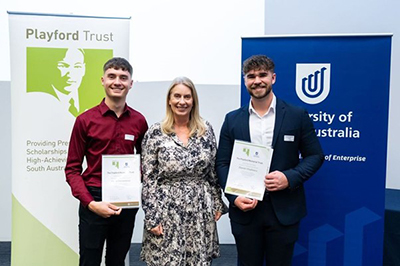 Playford Trust Scholarship recipients Caleb Ferraresso and Daniel Chalmers with UniSA Provost and Chief Academic Officer Professor Joanne Cys.
Playford Trust Scholarship recipients Caleb Ferraresso and Daniel Chalmers with UniSA Provost and Chief Academic Officer Professor Joanne Cys.Five UniSA students have been awarded Playford Trust Scholarships to help them make the most of their studies and contribute to the state’s knowledge, skills and research base.
Aaron Hayward, Adrian Brown, Daniel Chalmers and Caleb Ferraresso each received a Playford Trust Honours Scholarship, while PhD student Andrew Edwards was awarded a Playford Trust PhD Scholarship.
Each year, the Playford Trust, in partnership with the three SA public universities, offers 12 $7000 scholarships to South Australians intending to study an honours degree in one of the trust’s priority areas.
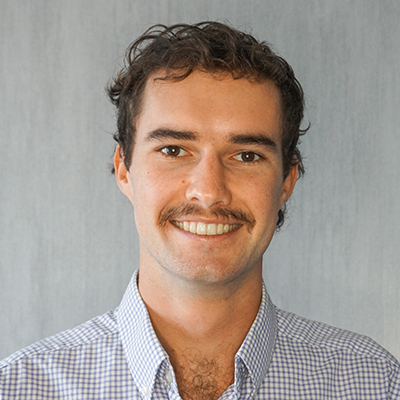 UniSA engineering honours student Aaron Hayward won a Playford Trust Honours Scholarship.
UniSA engineering honours student Aaron Hayward won a Playford Trust Honours Scholarship.Engineering student Aaron Hayward will use his scholarship to complete an internship in Europe with German-based hay and silage equipment manufacturer Krone, which serves the fodder industry.
His research will focus on one of Krone’s machines, the BigPack Square Baler, which collects and compresses dried hay into compact, high-density bales for ease of handling, transport and storage to eventually be used for animal feed.
“The fodder industry is one of the most important agricultural sectors around the world and feeding the animals that feed the world with quality produce is extremely important,” Hayward says.
“Within the industry, traceability across the supply chain plays a crucial role ensuring food safety. Today’s consumers demand high levels of traceability with any products they buy, so as the industry grows, farmers and traders are striving for better traceability protocols.”
Information Technology student Adrian Brown aims to form a studio in Adelaide that will use the newest technologies to create revolutionary games.
His honours project will research how ChatGPT and similar language models can be used in game development to create unique experiences for players.
Off the back of three months working at the Australian Submarine Corporation, engineering student Daniel Chalmers will explore new approaches to metal additive manufacturing.
Chalmers hopes to take his research further in the future, where metal additive manufacturing will be integral to engineering and rapid prototyping.
Engineering student Caleb Ferraresso’s project will see him working with Cornell University in the design of an advanced golf ball return system for the PGA Tour.
Excelling in maths and science, Ferraresso has earned work placements with leading engineering corporations such as BAE systems, Cornell Design and Coiltek.
PhD student Andrew Edwards has worked in the South Australian defence industry for 10 years.
His current research aims to discover the ways in which quantum light mechanics can be used to secure satellite-based communication networks and ensure confidentiality.
International recognition for UniSA’s Enterprise Hub
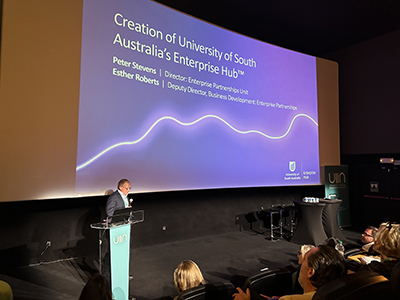 Enterprise Hub director Peter Stevens at the UIIN 2024 Conference.
Enterprise Hub director Peter Stevens at the UIIN 2024 Conference.UniSA’s model for creating the Enterprise Hub has received international recognition for fostering innovation.
The UniSA Enterprise Hub took out the Most Creative Award at the prestigious University Industry Innovation Network (UIIN) 2024 Conference in Madrid.
Enterprise Hub director Peter Stevens and deputy director Esther Roberts showcased UniSA’s unique approach to engagement to an audience of around 400 peers from institutions around the world.
The University was praised for its innovative strategies in partnering, incubation and entrepreneurship, its focus on Aboriginal research and Aboriginal partnership, as well as the industry sector model and operating system.
UniSA Deputy Vice Chancellor for Research and Enterprise Distinguished Professor Marnie Hughes-Warrington AO says the conference recognised UniSA’s approach as not just innovative but also best practice, highlighting the impact of the industry front door and framework of engagement.
“This recognition is a testament to the University’s vision and commitment to creating the Enterprise Hub, and the dedication of everyone who contributed to the project,” Prof Hughes-Warrington says.
“This is a proud moment for the entire UniSA community and affirms that our commitment to pushing boundaries and fostering innovation is not only recognised but celebrated on a global stage.”
UniSA’s Dr Evangeline Mantzioris features in Webby Award-winning podcast
UniSA’s Dr Evangeline Mantzioris’s contribution to the SBS podcast, ‘Should You Really Eat That?’ has helped it secure a Webby People’s Voice Award, regarded by the New York Times as “the Internet’s highest honour”.
The win follows Dr Mantzioris’s participation in four of the podcast’s six episodes, lending her expert advice as a leading dietitian and the program director of Nutrition and Food Sciences at UniSA.
‘Should You Really Eat That?’ explores the social, cultural, and nutritional uncertainty surrounding the food and drinks people consume.
Dr Mantzioris discusses some of society’s diet staples with podcast creator and host, food writer Lee Tran Lam.
They delve into how much fish is too much, especially for pregnant women; the importance of cheese portion control; the universal wonder of bread; and the mixed messages about rice.
The Webby Awards honour “the Best of the Internet”, with nominees selected by the International Academy of Digital Arts and Sciences (IADAS) – a 3000+ member judging body comprising internet experts, business figures, luminaries, visionaries and creative celebrities.
The People’s Voice Award is voted on by the online public, with more than 3.5 million votes cast in 2023.
The 28th iteration of the ceremony was hosted in May, where the SBS podcast was awarded from among more than 13,000 entries.
‘Should You Really Eat That?’ joins the ranks of Webby Award-winning podcasts alongside productions such as Michelle Obama’s ‘The Light Podcast’, and NASA’s ‘Curious Universe: Suiting Up for Space’.
Dr Julie Collins named SA’s Historian of the Year
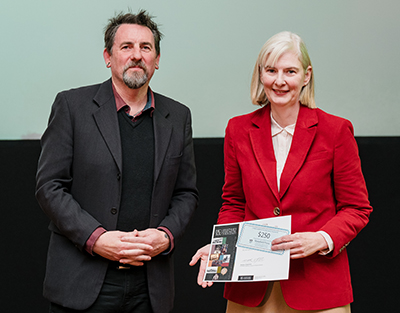 Professor Matt Fitzpatrick, president of the History Council of South Australia, with Dr Julie Collins at the 2024 South Australian Historian of the Year Awards. Photo by Dylan Sanders – Frankie the Creative.
Professor Matt Fitzpatrick, president of the History Council of South Australia, with Dr Julie Collins at the 2024 South Australian Historian of the Year Awards. Photo by Dylan Sanders – Frankie the Creative.UniSA architecture historian Dr Julie Collins has been named the South Australian Historian of the Year for her commitment to exploring the state’s rich built heritage and influencing its preservation.
The 2024 History Council of South Australia awards, announced at the finale for South Australia’s History Festival, also recognised individuals and groups contributing to the field of history across the state, from Burra to the Barossa and Gawler to Tailem Bend.
History Council of South Australia president Professor Matthew Fitzpatrick says the annual awards aim to shine a light on professional and amateur historians quietly going about the business of researching, celebrating and preserving the state’s past – often for decades and generally unheralded.
“To understand the past is to better appreciate what the future might hold,” he says. “We are indebted to our award winners and nominees who’ve poured their hearts into history projects across the state and made South Australia a richer place for it.”
Dr Collins, an internationally respected historian, is the curator at UniSA’s Architecture Museum, and is responsible for its collection of 500,000 items. Through recent projects exploring South Australia’s sleepouts, department store buildings, Adelaide Oval and clock towers, she has raised awareness of history and brought it to new audiences.
Zurich honours for UniSA postdoc investigating how buildings affect our brains
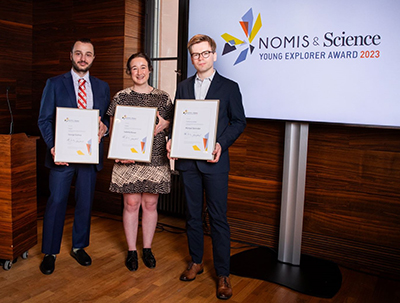 Dr Isabella Bower, flanked by two other NOMIS & Science Young Explorer Award recipients, at the Zurich presentation night.
Dr Isabella Bower, flanked by two other NOMIS & Science Young Explorer Award recipients, at the Zurich presentation night.UniSA researcher Dr Isabella Bower travelled to Zurich this month to receive a NOMIS and Science Young Explorer Award for her ongoing work investigating the impact of building design on brain functioning and mental health.
The postdoctoral researcher, who has a background in architecture and psychology, is the first Australian recipient of the Swiss-based award, which recognises early career researchers undertaking inspiring, ground-breaking scientific research.
Dr Bower’s award-winning essay published in Science last November, “How do our environments affect our minds?”, earned her the nomination and a trip to the University of Zurich, where she gave a brief talk about her research.
The UniSA researcher was joined by seven other award recipients from the United States and Switzerland.
Sir Eric Neal celebrates his 100th birthday
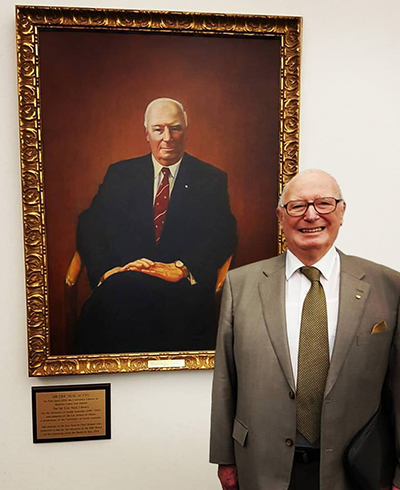 Sir Eric Neal next to his portrait, which is displayed in the Sir Eric Neal Library at UniSA’s Mawson Lakes campus.
Sir Eric Neal next to his portrait, which is displayed in the Sir Eric Neal Library at UniSA’s Mawson Lakes campus.Leading engineer, famed business executive and former Governor of South Australia, Sir Eric Neal AC CVO FTSE, celebrated his 100th birthday on 3 June. The achievement adds to an already spectacular list of innovations and corporate successes as one of the most influential businessmen in Australia.
Sir Eric Neal attended a morning tea hosted by UniSA’s Sir Eric Neal Library, Mawson Lakes campus, on 18 June in celebration of the milestone.
A graduate of one of UniSA’s predecessor institutions, the South Australian School of Mines, Sir Eric is a pioneer in the engineering industry, contributing to renowned projects such as the Sydney Harbour Tunnel and the Snowy Mountains Hydro-Electric Scheme.
He spent 14 years as the CEO of Boral and served as a director for companies including Wormald International, John Fairfax, Atlas Copco, Coca-Cola Amatil and Broken Hill Proprietary (BHP).
Sir Eric’s resume includes countless memberships for organisations and institutes across the globe and several awards, such as the prestigious Friends of the Duke of Edinburgh’s Award, the Rotary Vocational Excellence Award, the Companion of the Order of Australia, and Knight of Grace of the Order of St John.
UniSA hosts the Sir Eric Neal Collection, which documents his distinguished contributions to engineering and Australian business.
To celebrate his significant achievements, the collection is being displayed in an exhibition at the Sir Eric Neal Library, which includes a comprehensive online timeline of Sir Eric’s life, from his birth in London, 1924, to his 100th birthday this year.
The collection comprises reports, correspondence, programs, invitations photographs and other records of Sir Eric’s diverse activities in business and the community. It honours a life of spectacular accomplishment and legacy.
Sir Eric Neal’s birthday was celebrated on the UniSA Bradley Building’s LED screen earlier this month.
Contemporary arts star receives Helpmann Academy InReview Mentorship
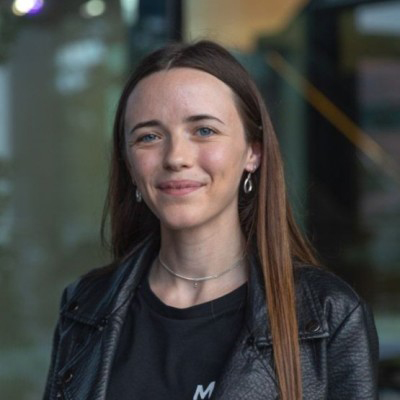
UniSA graduate Brooke Ferguson has been recognised for her skill in the practice of visual arts as a recipient of the Helpmann Academy InReview Mentorship.
The mentorship is a partnership between Helpmann Academy and InReview, a non-profit arts journalism project designed to strengthen arts reviewing in Australia. It connects experienced arts writers with emerging artists, where arts reviewing skills are nurtured over 10 eight-hour weeks.
Artists will finish the mentorship with multiple reviews set for publication in InReview and a refined ability to engage in analysis of the performing and visual arts.
Ferguson says she’s most excited for the opportunity to develop her writing and critical thinking skills throughout the InReview mentorship.
“I hope to spark thoughtful dialogue inspired by the artists in South Australia that I’ll be reviewing,” she says.
Ferguson’s visual art practice utilises the mediums of painting and photography, to explore abstraction, rituals, the everyday and nature. As a recent graduate from UniSA’s Bachelor of Contemporary Art, she says the degree has helped her articulate her practice and understand why she makes art.
“The Bachelor of Contemporary Art has shown me that pursuing a career in the arts is possible and worthwhile, and as a moderator and the Futures Officer at UniSA’s MOD., I’ve been able to fuel my artistic inspiration but also enhance my ability to engage with diverse audiences and address complex themes,” she says.
 Brooke Ferguson, Sky & Water – (Nature’s Nurture study 2), 2024, oil on canvas
Brooke Ferguson, Sky & Water – (Nature’s Nurture study 2), 2024, oil on canvasFerguson has two artistic projects in the works. The first, titled Nature’s Nurture, is a series of abstract artworks inspired by the local environment, where she will present familiar experiences in unconventional ways to highlight the beauty of one’s surroundings.
This project will feature a series of paintings that focus on water, inspired by an upcoming two-week residency in Cairns, where she hopes to capture the healing powers that one can experience through connecting to nature.
Her second project, August 10, is currently showing at the Adelaide Railway Station. August 10 is a photography exhibition sharing the everyday observations of five South Australian artists and photographers, including co-curator Renee Pastore.
The exhibition will run until 24 June. Examples of Ferguson’s work can be viewed on Instagram.
King’s Birthday Honours for UniSA community
Alumni, honorary doctorate recipients and other members of the UniSA community are among those recognised in this year’s King’s Birthday Honours List.
Those receiving honours included UniSA honorary doctorate recipient Greg Combet, who was made an Officer of the Order of Australia (AO) for distinguished service to the people and Parliament of Australia, and to the banking and superannuation industries. Former UniSA Council member, the late Sir James Hardy OBE, was also made an AO, for distinguished service to yachting, to the business sector, to charitable organisations, and to the community.
A full list of the University’s alumni community who were acknowledged in the King’s Birthday Honours is available on the UniSA alumni network pages.
Other recent award winners
Other recent award recipients from UniSA include:
- University of Melbourne 2024 Arts Alumni Awards Lifetime Achievement Award – Professor Anthony Elliott AM. Read more
- The Australian Council of Graduate Research Excellence 2024 Award for Excellence in Graduate Research Supervision, special commendation – Associate Professor Tasha Stanton. Read more
ANNOUNCEMENTS
New Adelaide University receives formal registration
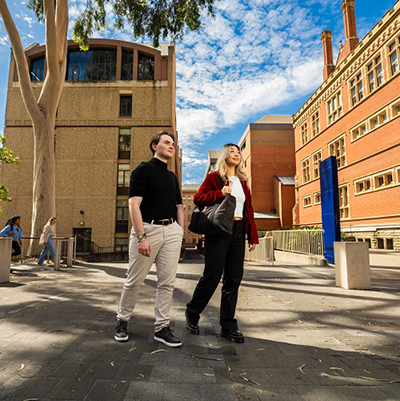
The new Adelaide University has received registration from the Tertiary Education Quality and Standards Agency (TEQSA) as an Australian university higher education provider, and for the maximum possible period of seven years.
Adelaide University co-Vice Chancellors, Professor David Lloyd and Professor Peter Høj AC, said this was a significant milestone in the creation of the new university for South Australia.
“This is an important step forward in the formal regulatory process and provides absolute confidence in our stated ambition as we prepare to launch the nation’s new for-purpose university,” professors Lloyd and Høj said.
“It has been a thorough process and we thank the regulator for their collaborative and professional approach in working with our teams.
“Adelaide University has a compelling reason to exist – to enable educational excellence, equitable access, and excellent research become a driving force for good with impact that transcends borders – and we look forward to taking the new institution to the world.”
Adelaide University was officially established under state legislation in March 2024 to become a destination of choice for new generations of learners and talented researchers. The future-focused university will combine the strengths of the University of South Australia and the University of Adelaide to deliver nation-leading curriculum and student experience, greater access to education, and world-class research excellence.
TEQSA approvals signify that the new university has the robust governance and academic provisions in place to meet the independent regulator’s registration requirements.
The University of Adelaide and University of South Australia welcomed news of Adelaide University’s TEQSA registration as an endorsement of the program of work underway between the institutions to enact the delivery of the new University for its opening in January 2026.
APPOINTMENTS
UniSA welcomes new Chancellor and Council members
UniSA has a new Chancellor as well as four new members of its governing body, University Council, as part of changes related to work on the new Adelaide University.
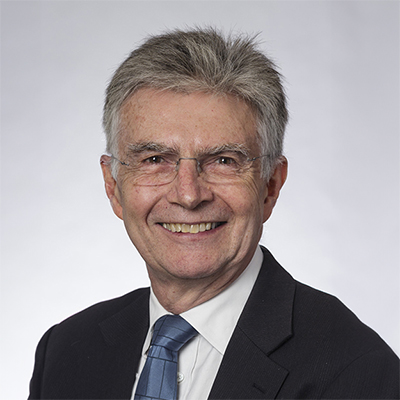
In April, Pauline Carr stepped down as Chancellor at UniSA to focus on her role as Adelaide University Transition Council Chancellor. John Hill, who was previously Deputy Chancellor at UniSA, was appointed as the University of South Australia’s new Chancellor at a Council meeting.
Hill has served on the UniSA Council since 2015 and was appointed Deputy Chancellor in December 2018.
His background includes several South Australian ministerial roles over more than a decade, including Environment and Conservation Minister, Health Minister and Arts Minister.
UniSA Vice Chancellor Professor David Lloyd says he’s been a great asset to the Council.
“John’s deep governance experience will continue to serve the University well in his new role as Chancellor,” Prof Lloyd says. “This includes membership on a variety of boards, including currently Bellberry Ltd and Private Healthcare Australia.”
Prof Lloyd says UniSA owes a debt of deep gratitude to Chancellor Carr for her enormous contributions on the UniSA Council over 14 years, including as Pro Chancellor from January 2018 then Chancellor from September 2018.
“Pauline has stepped down from the UniSA Council as the workload for the Transition Council overseeing the delivery of the new Adelaide University intensifies,” he says.
“Pauline expertly stewarded the University through the COVID-19 pandemic and the transformation of our organisational structure in 2020. She has overseen UniSA as we’ve risen in key rankings, grown our Aboriginal engagement and awareness activities, strengthened our partnerships with industry and much more. It’s fitting that she will continue to shape the University’s future, albeit in a very different way, through her leadership of the Transition Council of Adelaide University.”
Together with Carr, Council members Nicolle Rantanen Reynolds, Carolyn Mitchell and Jim Hazel have stepped down from the UniSA Council to concentrate on their roles on the Adelaide University Transition Council as its activities increase.
“We thank them for their valuable contributions and their commitment to UniSA over many years,” Prof Lloyd says.
UniSA Council members Michael Abbott AO KC and Mary Patetsos AM have been appointed as UniSA’s new Deputy Chancellor and Pro Chancellor respectively.
New Council members

Four new members have been appointed to UniSA Council: Elaine Bensted, Ruth Blenkiron, John Evans and Terry Evans AM.
“Ruth, John, Elaine and Terry are highly experienced in governance and management and bring a comprehensive set of skills across the public, private and university sectors,” Prof Lloyd says.
Their biographies and qualifications are published on the University Council Members page.
Current membership of the Adelaide University Transition Council can be viewed on the Adelaide University microsite.
UniSA VC joins committee to drive Universities Accord reforms
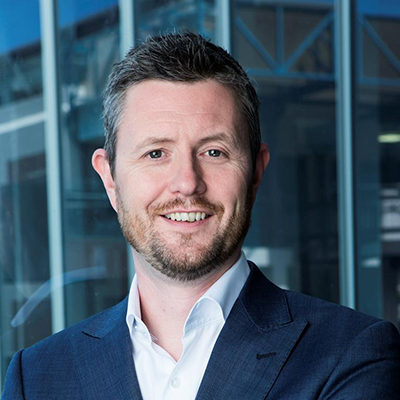
UniSA Vice Chancellor Professor David Lloyd has been appointed to the Australian Universities Accord Implementation Advisory Committee.
The Australian Universities Accord is the biggest and broadest review of the higher education sector in 15 years and will set out a blueprint for industry reform for the next decade and beyond.
To help drive the Accord’s reforms, an Implementation Advisory Committee has been developed.
The committee will help design and implement recommendations to ensure universities are funded and supported to deliver on the expansive changes needed to support Australia’s future.
The Implementation Advisory Committee will be chaired by Tony Cook PSM, secretary of the Department of Education.
Professor Lloyd is one of eight other committee members including UniSA alumnus Professor Tom Calma AO who received an Honorary Doctorate from the University in 2023.
Other Stories
- Nutbush fever: How the Tina Turner hit became Australia's dance sensation
- Technology digs into need to send humans into mines
- End of the line for P&O: why is Australia such a tough market for the cruise ship industry?
- New Adelaide University to operate $60m defence academy
- From the Acting Vice Chancellor
- Achievements and Announcements
- Increased risk of homelessness for youth leaving out-of-home care
- UniSA helping the next generation of leaders from Papua New Guinea
- In Pictures: MOD. party and National Reconciliation Week
- The latest books from UniSA researchers




